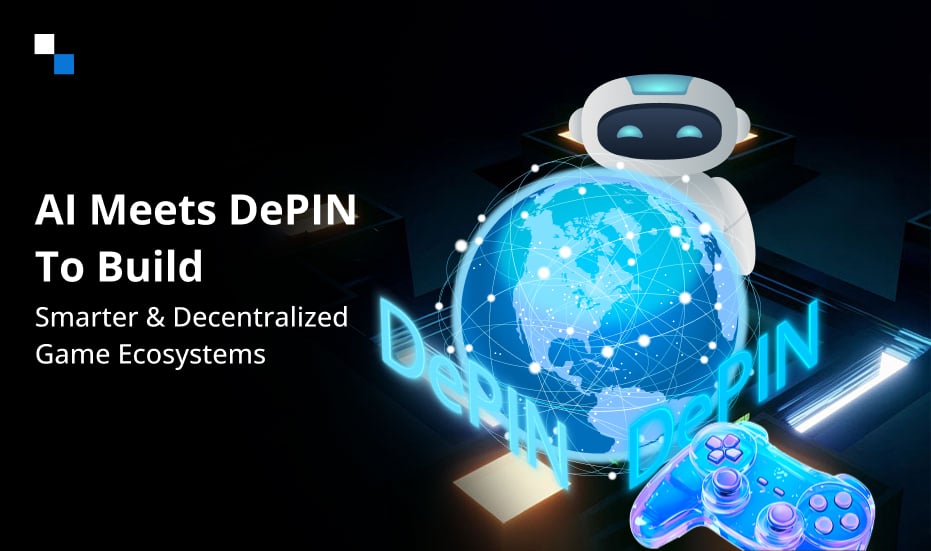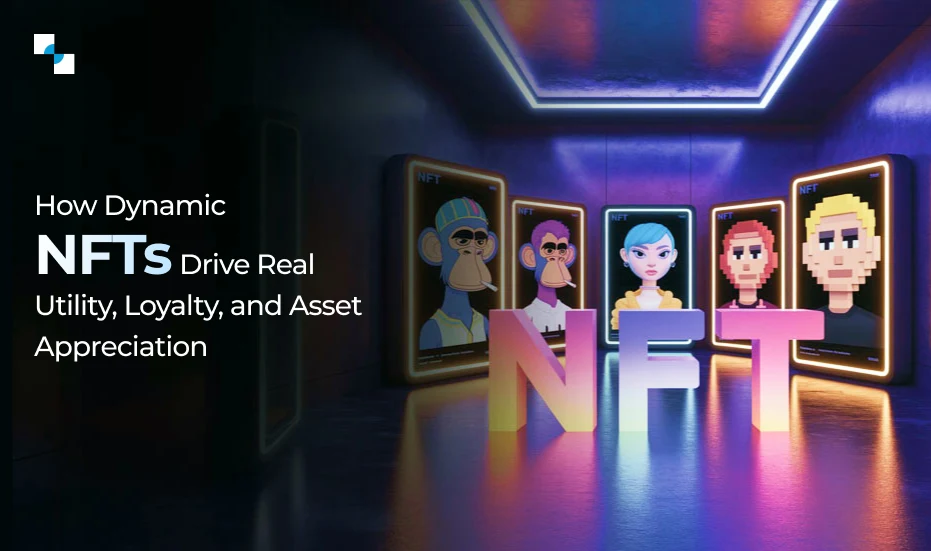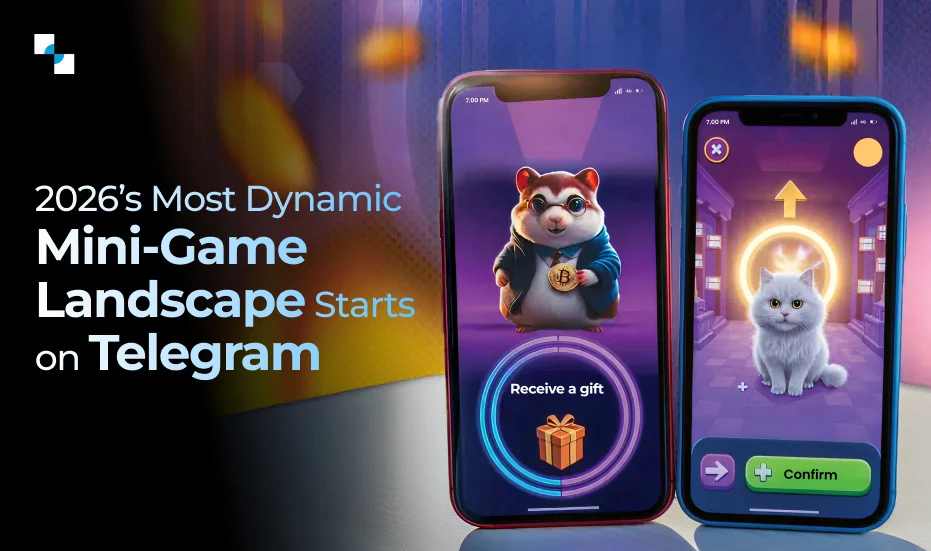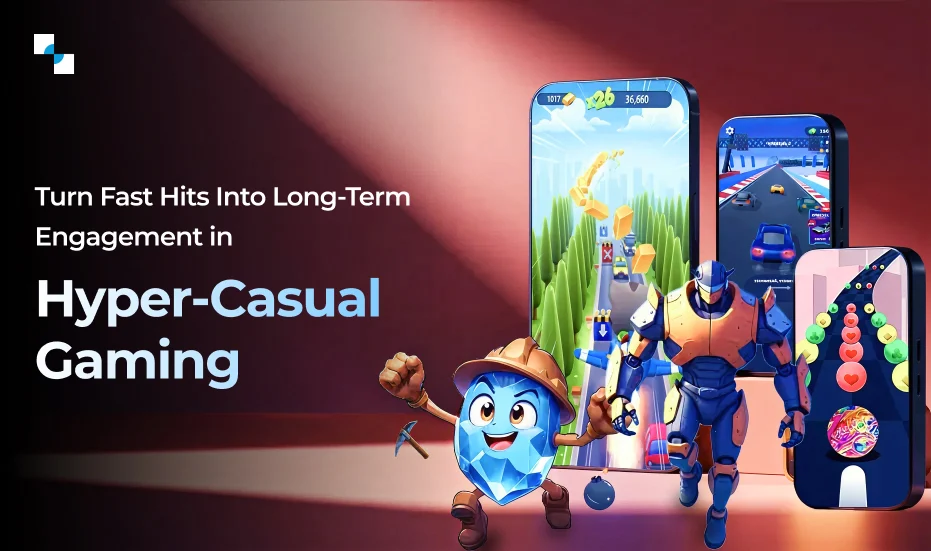As the digital ecosystem grows, Web3 gaming represents a considerable shift from traditional game formats, allowing for decentralized ownership, tokenized economies, and interoperable game assets. Yet, what is truly shifting the gaming experience is the combination of Artificial Intelligence (AI) and Decentralized Physical Infrastructure Networks (DePIN). While AI gaming and DePIN enable intelligent, scalable, and hyper-personalized experiences that are limited when packaged within centralized systems, this connection is shifting the gaming experience beyond just mechanics; it is changing the entire gaming experience ecosystem.
As more studios start to look outside cloud infrastructures, the benefits of decentralization become more evident. From improved security and uptime to AI-generated gameplay and monetization models, the combination of AI and DePIN-based technologies represents an opportunity for a decentralized revolution that puts players at the front of the game development and evolution process.
Understanding DePIN: The Backbone of Decentralized Gaming Infrastructure
At root, DePIN (Decentralized Physical Infrastructure Networks) is a new model in which infrastructure services (e.g. computing power, storage, bandwidth, geospatial data, etc.) are provided by a widely distributed community of participants as opposed to by centralized entities. These participants would be acting as either nodes or just providing resources, and are rewarded through blockchains.
Unlike traditional cloud-based infrastructures, DePIN enables the distribution of infrastructure responsibilities to a broad and growing network of participatory contributors so that most bottlenecks and single points of failure are eliminated. DePIN supports decentralized infrastructure, making it inherently more secure, resilient, and democratic—essential elements to support next-generation, large-scale Web3 gaming ecosystems.
In the context of gaming, a DePIN would create an underlying base layer for everything from playing multiplayer sessions to storing NFTs and training AI models to real-time rendering. It would enable massive, permissionless scalability against traditional infrastructure, allowing studios to build intelligent, always-available games that do not rely upon traditional service providers.
Key Benefits of DePIN for Web3 Gaming:
- Decentralization: Eliminates reliance on centralized cloud providers.
- Incentivization: Encourages global participation through token rewards.
- Scalability: Supports growing player bases without performance drops.
- Resilience: Ensures high availability and resistance to outages or censorship.
DePIN lays the groundwork for immersive, intelligent, and autonomous AI gaming experiences, empowering developers and players alike in a truly decentralized ecosystem.
The Role of AI in Gaming: From NPCs to Neural Economies
Artificial intelligence has always been part of game development, but how we are using its capabilities is changing rapidly. AI in games is evolving past, informing NPC behavior; AI now generates environments, designs economies, and learns from the player’s inputs, changing in response dynamically.
AI is dramatically improving the storytelling, realism, and interactions in games through processes such as procedural content generation and sentiment analysis. In a progression from neural networks trained to learn from gameplay data, developers can create more responsive in-game experiences uniquely for the player level, smarter AI opponents, and customized challenges to create longer gameplay experiences.
Applications of AI in Gaming:
- Procedural Content Generation: AI builds endless, unique game worlds.
- Dynamic Storytelling: Adaptive narratives respond to player choices.
- AI-Driven Economies: Simulates supply/demand for in-game assets.
- Player Retention: Analyzes user behavior to customize game difficulty and rewards.
As Web3 gaming adopts more complex models for open-world mechanics, token economics, and multi-chain interoperability, AI becomes essential for maintaining engagement, balancing systems, and ensuring equitable progression.

AI x DePIN: Building Intelligent, Autonomous Web3 Gaming Ecosystems
AI gaming with DePIN infrastructure can also respond, learn, and optimize in real time, effectively transforming the network from a static infrastructure to a smart and dynamic infrastructure for Web3 gaming. This becomes feasible because of the scalable compute allocation, latency-aware rendering, and AI moderation.
AI and DePIN can also support self-healing networks, enabling all aspects of infrastructure to respond automatically to network congestion and compute needs. AI agents could also be applied to DAO governance in the future, or even directionally relevant arbitration in a game, and optimally leverage resources in the networks with the layers of DePIN.
Key Integrations:
- Nosana and Gaimin: Enable distributed training of AI models for NPCs and real-time analytics.
- Render and Aethir: Provide AI-assisted rendering pipelines for 3D environments.
- The Graph and Ankr: Use machine learning to optimize blockchain indexing and querying.
- Filecoin and Arweave: Integrate AI to manage and retrieve gaming data efficiently.
Together, they empower developers to build autonomous game ecosystems that self-optimize, reducing the burden of manual oversight and dramatically improving performance.
Compute Networks Powering AI-Driven Gaming
AI processes that are compute-intensive will need scalable architectures to deploy. This is where DePIN will come into play and where model training and inference can happen using the cloud, but with DePIN’s Compute Networks. The front-running projects we see today, Gaimin, Nosana, and BitTensor, already provide distributed, on-demand compute power for AI model training and inference across many AI games.
Traditional cloud services can clog the pipeline because of price, centralized control, and hardware. The DePIN compute networks will help us emerge from that bottleneck by having IO/in-scope; we will harness distributed IO-consuming idle GPU and CPU resources all over the world, giving us tangible returns on our investment (time, resources) while democratizing access to high-performance infrastructure and computing resources.
Why Compute Networks Matter:
- GPU Accessibility: Use underutilized consumer and industrial GPUs for AI tasks.
- Decentralized AI Labs: Enable indie developers to train and test ML models.
- Cost Efficiency: Reduce infrastructure costs through token incentives.
- Incentivized Participation: Communities contribute computing power in exchange for rewards.
These networks support everything from graphics rendering to machine learning algorithms in Web3 gaming, making them an essential building block for any forward-thinking game studio.
Bandwidth, Storage & Rendering: Building Real-Time, Immersive Metaverse Experiences
A seamless Web3 gaming experience goes beyond compute. In addition to compute, bandwidth, storage, and rendering capabilities are essential to facilitate immersive and responsive gameplay. DePIN solutions for bandwidth (such as AIOZ), storage (such as Filecoin), and rendering (such as Render) will round out the decentralized stack.
Blockchain-enabled ownership models for gaming mean that digital assets, such as avatars, items, maps, and achievements, will also need to be securely stored in a way that allows for on-demand access. DePIN storage networks are unique in that they achieve previously unrealized levels of resilience and transparency in the storage of data.
Functional Benefits:
- Content Delivery: Decentralized CDN providers like AIOZ and Theta deliver game updates and patches faster.
- Persistent Data: Filecoin and Arweave offer reliable, tamper-proof data storage for assets and player history.
- Immersive Rendering: Render Network offloads high-end rendering to distributed GPUs, reducing device burden.
- User-Generated Content (UGC): DePIN enables creators to store and serve custom mods and assets securely.
This infrastructure enables global-scale AI gaming experiences that are more resilient, responsive, and player-controlled.
AI-Driven Geospatial and Environmental Inputs in Open-World Games
Open-world and AR games are increasingly beginning to rely on real-time data about the world to maintain their realism for gameplay mechanics. DePIN-based Geospatial Networks allow AI to access real-time environmental information, so AI gaming can grow in context.
These Networks connect the digital and physical, creating the potential for more interactivity with players and immersion. Consider a game that would change based on the weather, time zone, or an event in the real world.
Use Cases in Gaming:
- Geo-Based Challenges: NATIX and GeoDB allow games to create real-time, location-based quests.
- Dynamic Environments: PlanetWatch and Ambient stream live weather data to change in-game visuals.
- Augmented Reality (AR): ROVR and Nubila help AR games map and adapt to physical surroundings.
- Live Events: Integration with real-world event data enhances roleplay or esports scenarios.
This layer of realism and responsiveness creates opportunities for Web3 Gaming titles to innovate in both storytelling and interaction.
Blockchain + DePIN Synergy in Web3 Gaming
Blockchain provides the economic and transactional framework of Web3 gaming, and DePIN provides the decentralized infrastructure – together they provide scalable, player owned ecosystems. Chains like Ethereum, Polygon and Solana allow for smart contracts, while DePIN-focused chains like Peaq and Iotex manage device-level decentralization.
The integrated approach of Web3 gaming and DePIN assures players are not simply consumers but are stakeholders: they can earn, govern, and add value to game development through on-chain activities as well as AI-powered feedback systems.
Combined Advantages:
- Tokenized Assets: Players own and trade in-game items, characters, and achievements.
- Cross-Game Portability: Interoperability allows for unified experiences across multiple titles.
- AI-Powered Governance: Smart contracts run automated decisions based on player behavior.
- Player-Driven Economies: DePIN and blockchain create sustainable economic loops.
This convergence is central to creating sustainable, equitable, and engaging next-gen gaming ecosystems.
Why Antier is Positioned to Build the Next Generation of AI + DePIN Web3 Games
Antier is a leading provider of Web3 gaming and decentralized infrastructure services globally. Leveraging our multi-dimensional expertise in blockchain, AI, and DePIN integration, Antier builds scalable, player-centric games with smart back-end systems for smooth cross-play. We provide the same levels of infrastructure flexibility whether you’re developing a AAA franchise or indie P2E experience.
Our in-house expertise includes smart contracts, NFT design, AI algorithm integration, DePIN integration, and cross-chain interoperability. We mesh together creativity, security, and technology to deliver intelligent gaming ecosystems in a scalable manner.
Why Partner with Antier:
- Track Record: Delivered 100+ blockchain and gaming projects across global markets.
- Tech Stack: Expert teams in AI, blockchain, and real-time rendering.
- Methodology: Agile development lifecycle tailored for iterative game builds.
- Vision: Committed to community-driven, future-ready game ecosystems.
From ideation to go-to-market, Antier offers full-stack support for ambitious gaming ventures.
The Future of Intelligent, Player-First, Decentralized Gaming
Combining AI gaming and DePIN infrastructure is a major change in the way games are constructed, played, and monetized. By utilizing decentralized networks and machine intelligence, gaming developers can create games that are immersive, secure, scalable, and player-owned. Essentially, developers are producing players a digital asset through play!
With Web3 gaming gaining traction, AI algorithms, decentralized nodes, and (preferably) imaginative individuals ready to disrupt the past will determine the future. The integration of intelligence and decentralization is not a fad. It is the new normal in gaming.
Interested in co-creating the next evolution of gaming? Let Antier be your partner.







